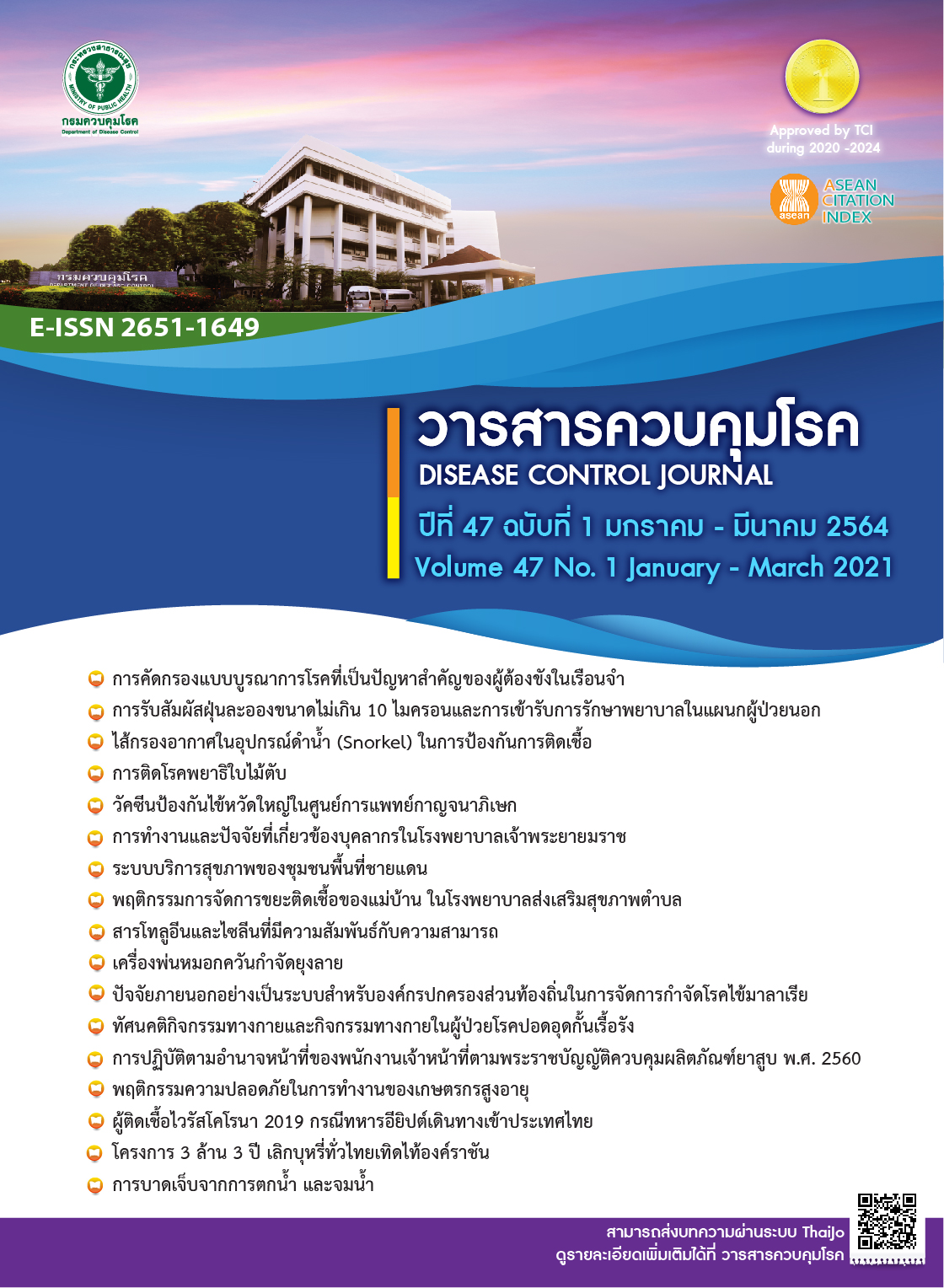Results of implementing “Quit for King” stop smoking project (Phase 2)
DOI:
https://doi.org/10.14456/dcj.2021.16Keywords:
health network, quit smoking, tobacco control policyAbstract
The tobacco control project “Quit for King” phase 2 was supported by Thai Health Promotion Foundation. This action research aimed to describe the results of implementing “Quit for King” project phase 2 and explore the success and hindering factors of implementing project. The project was mainly conducted, from June to December 2018, by Health Technical Office of Ministry of Public Health (MOPH), Boromarajonani College of Nursing in each region of Thailand, together with the District Health Offices and District Health Promotion Hospitals. The targeted areas involved 400 districts across Thailand. The study process comprised of planning, collecting data, monitoring and evaluation, lesson learned, and seeking for the best practice of smoking cessation in provincial, district and subdistrict levels. Findings revealed that 83 % of all areas across Thailand participated in the project, which included 332 districts from 76 provinces of 12 health region offices. Of all 549,908 smokers who participated in the project, 37,352 smokers had successfully quitted smoking for 6-month period (6.79 %). The facilitating factors were strengthening community participation, health network of smoking cessation, positive support from the provincial public-health administrators, innovation to help quit smoking, and promoting law enforcement. Hindering factors involved coordination with people in the area of operation, changing in report system, physical characteristics of the operating area. Policy recommendations are providing quit smoking projects to be ongoing in the social stream to encourage the public awareness of smoking harms.
Downloads
References
World Health Organization. WHO report on the global tobacco epidemic, monitoring tobacco use and prevention policies [Internet]. 2017 [cited 2020 Jan 20]. Available from: https://www.who.int/tobacco/global_report/en/
World Health Organization. Fact sheet 2018 Thailand, Fact sheet about health benefits of smoking cessation [Internet]. 2018 [cited 2020 Feb 20]. Available from: https://apps.who.int /iris/bitstream/handle/10665/272690/wntd_2018_thailand_fs.pdf?sequence=1
World Health Organization. M-power: A policy package to reverse the tobacco epidemic [Internet]. 2008 [cited 2020 May 10]. Available from: https://www.who.int/tobacco/mpower /mpower_english.pdf
World Health Organization. WHO Framework convention on tobacco control 2003 [Internet]. [cited 2020 May 10]. Available from: https://apps.who.int/iris/bitstream/handle/10665/42811 /9241591013.pdf?sequence=1
Bureau of Tobacco Control (TH), Department of Disease Control, Ministry of Public Health. Second Nation Strategic Plan for Tobacco Control 2016-2019. Nonthaburi: Bureau of Tobacco Control; 2016. (in Thai)
National Statistical Office (TH). The result from Thai population of smoking behavior survey [Internet]. 2019 [cited 2020 Jan 20]. Available from: http://www.nso.go.th/sites/2014/Pages /News/2561/N31-08-61-1.aspx (in Thai)
Loysmut S. New tobacco products on social media and law enforcement on new tobacco products control. Public Health & Health Laws Journal. 2019;5:13-28. (in Thai)
Kaewsuwan K, Kalampakorn S. Development of smoke-free community model in Thunghuachang district, Lamphun province. Thai Journal of Nursing. 2012;61:54-61. (in Thai)
Sena W, Daenseekaew S, Chaiypoom N. Community learning process development in creating family partnership to minimize cigarette smoke exposure at home for informal workers with diabetes mellitus. Journal of Nursing and Health Care. 2018; 36:205-13. (in Thai)
Muenhor C, Daenseekaew S. Development community participation model to reduce of cigarette smoke contact in the risk group of chronic obstructive pulmonary disease. Journal of Nursing and Health Care. 2016;34:37-44. (in Thai)
Thai Health Promotion Foundation. Quit for King Project [Internet]. 2018 [cite 2020 Jan 20]. Available from: http://www.quitforking.com/pages/view/history. (in Thai)
Boonpleng W, von Bormann S, Thongpat S, Ritruechai S, Thanadkit G, Khamwong W, Experiences of village health volunteers in ‘Three Millions-Three Years Anti-smoking Project’. The Public health journal of Burapha University. 2020;15(2):74-85
Burns A, Webb M, Stynes G, O'Brien T, Rohde D, Strawbridge J, Clancy L, et al. Implementation of a quit smoking programme in community adult mental health services-a qualitative study. Front Psychiatry. 2018;9:670.
Kaewnawee J, Kalampakorn S, Nilmanat K, Kankaew P. The development of smoke free community model in Khokpho district, Pattani province: A participatory action research. TJN. 2014;63(1):6-14
Chang FC, Sung HY, Zhu SH, Feng TY, Ti S. Effects of smoking cessation media and community campaigns in Taiwan. Am J Health Promot. 2017;31:43-51.
Piriyakitkamjorn B, Chutipattana N. Approaches to smoking prevention and smoking cessation among youth in Songkhla Province. The Southern College Network Journal of Nursing and Public Health. 2018;5:1-16.
Tipyawong T, Tipywong P. Smoking cessation: a current update from FCTC article 14 adoption in Thailand. RTA Med J. 2016;68:181-92.
Lumrod N, Ruamsook T, Hoikum A, Sattawatcharawanij P. The roles of community nurses in capacity building for smoking cessation of village health volunteers. J Hlth Sci Res. 2020;14(1):139-44. (in Thai)
Downloads
Published
How to Cite
Issue
Section
License
Articles published in the Disease Control Journal are considered as academic work, research or analysis of the personal opinion of the authors, not the opinion of the Thailand Department of Disease Control or editorial team. The authors must be responsible for their articles.






